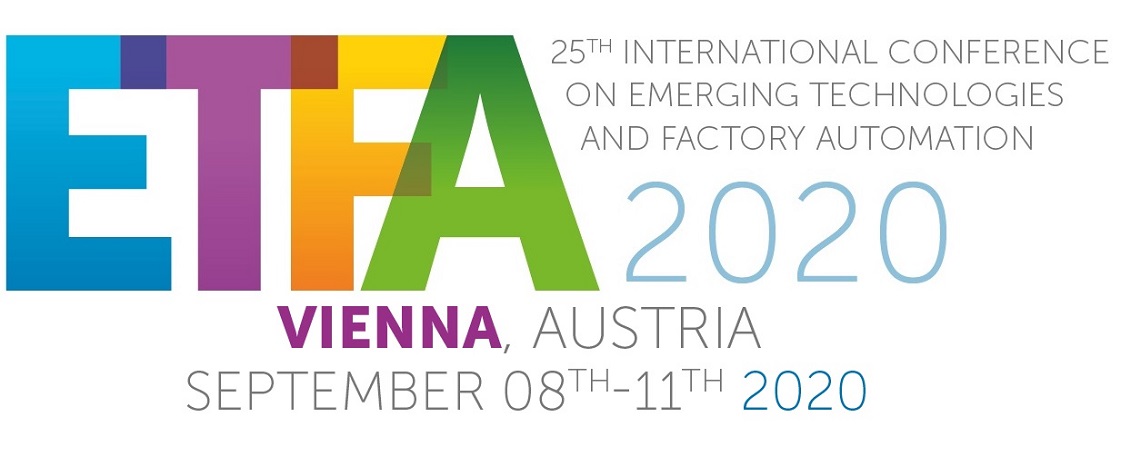SS 01 - Industrial Cybersecurity Methods and Technologies
Special Session Organized by |
|---|
|
Paulo C. Bartolomeu, University of Aveiro, Portugal and Stefano Marrone, University of Campania, Italy and Ricardo J. Rodríguez, University of Zaragoza, Spain |
Download Call for Papers |
|---|
Click here to download the session cfp.
Focus |
|---|
Industrial cybersecurity has emerged as a key topic of research in recent years due to the massive connectivity brought by the Internet of Things and the rise of cyberattacks against industrial assets. While fostering contemporary use-cases and applications, the ubiquitous access to the Internet has also exposed legacy operational technologies to new and challenging security threats that need to be addressed. This Special Session focuses on novel security, safety, and privacy-enhancing technologies for existing and future industrial applications, aiming at bringing together researchers, practitioners, and experts from industry that conduct innovative cybersecurity work on related technical fields.
Topics under this track include (but not limited to): |
|---|
- Security, safety, or privacy - enhancing technologies in industrial systems
- Modeling of cybersecurity threats
- Applications of distributed ledger technologies / blockchains in Industry 4.0
- Self - sovereign identity for M2M and decentralized device - to - device communication
- Hardware advances for securing Industrial devices and networks
- Quantitative evaluation and / or interconnections among non-functional aspects (e.g., reliability vs.safety, security vs.performance)
- Run-time methods and technologies for Complex Event Detection systems
- Software engineering methods and techniques for high dependable control systems
- Case studies / lessons learned of security, safety, or privacy assessments of industrial systems
Complete Details |
|---|
Click here for complete details.
SS 02 - Challenges of Machine Learning in Intelligent Technical Systems
Special Session Organized by |
|---|
|
Diana Göhringer, Technische Universität Dresden, Germany and Christoph-Alexander Holst, inIT – Institute Industrial IT, Germany and Anton Pfeifer, inIT – Institute Industrial IT, Germany |
Download Call for Papers |
|---|
Click here to download the session cfp.
Focus |
|---|
Machine Learning techniques have achieved outstanding performances in numerous computing problems. But the requirements of technical systems still pose considerable challenges for data-driven machine learning methods. Challenges lie in the nature of available data resulting in uncertainties, conflict, incompleteness, low quality, and sparsity. On the other hand, technical systems require learners and models which are able to run in real-time, on limited hardware, are interpretable, robust, highly accurate, adaptable, and secure. This special session aims at advancing and enhancing machine learning methods regarding these challenges and requirements. Applications range from, but are not limited to, predictive maintenance and analytics, quality management, product design, assistance systems, optimization, and computer vision.
Topics under this track include (but not limited to): |
|---|
- Feature selection and extraction
- Information fusion systems
- Machine learning on resource limited hardware
- Robust machine learning in light of uncertain and error-prone data
- Explainable machine learning models
- Cognitive computing
- Reinforcement learning in industrial environments
- Learning on streaming data
- Adapting models in non-stationary environments
Complete Details |
|---|
Click here for complete details.
SS 03 - Industrial Internet for the Factories of the Future
Special Session Organized by |
|---|
|
Marco Ehrlich, inIT – Institute Industrial IT, Germany and Jürgen Jasperneite, Fraunhofer IOSB-INA, Germnay and Sebastian Schriegel, Fraunhofer IOSB-INA, Germnay and Henning Trsek, inIT – Institute Industrial IT, Germany and Lukasz Wisniewski, inIT – Institute Industrial IT, Germany |
Download Call for Papers |
|---|
Click here to download the session cfp.
Focus |
|---|
This special session is dedicated to bring together experts from various domains, such as IT, telecommunication, OT, and automation, in order to discuss and elaborate on challenges in the area of industrial communication inside the factories of the future. Nowadays, several highly sophisticated technologies are implemented in factories to realize a high variety of industrial applications. These implementations are able to achieve high performances in terms of e.g. cycle times and reliability. However, this performance is typically only feasible within strictly defined technologies or vendor specific communication domains, so that the interoperability becomes a big issue. Moreover, management and configuration of these networks is solely possible using vendor specific tools. The current market situation brings new requirements towards safety, security, flexibility, user-friendliness, and interoperability of the communication infrastructures. It is crucial to build industrial systems that are easy to rearrange, reconfigure, and in the same time offer high communication performance. To achieve this, innovative and sophisticated management approaches for heterogeneous and complex network infrastructures are needed. These approaches should not only consider the legacy wired and wireless communication technologies but also the newest Time Sensitive Networking (TSN) amendments as well as the currently developed 5G standard.
Topics under this track include (but not limited to): |
|---|
- Future-proof, user-friendly, and dynamic network management for the industrial automation
- Utilisation of well-established IT solutions, such as SDN, NFV, and cloud, edge, or fog
- Machine-learning algorithms and concepts for control of heterogeneous industrial networks
- Safety and Security with regard to industrial network management
- Network Slicing models and corresponding implementation examples
- Adapters and functionalities for integrating legacy technologies or protocols
- Integration of TSN and OPC UA into the nowadays industrial communication
- Concepts of future-proof architectures to support private and public 5G implementations
- Deployment aspects, migration strategies, and co-existence of different network technologies
- Performance analysis of industrial network technologies and end-to-end QoS guarantees
Complete Details |
|---|
Click here for complete details.
SS 04 - SEnSEI - Skill Based Systems Engineering
Special Session Organized by |
|---|
|
Kathrin Evers, Festo AG & Co. KG, Germany and Jan R. Seyler, Festo AG & Co. KG, Germany |
Download Call for Papers |
|---|
Click here to download the session cfp.
Focus |
|---|
Large product catalogues, a wide variety of configurations and an almost infinite number of possible combinations make the selection and dimensioning of automation components and their combination into systems and plants a very time-consuming and difficult task. Today, the engineering process is a trial-and error approach. Based on experience the sales engineer gives the customer a first solution which then in turns influences the customers’ requirements. In several loops a possible solution is found. This process is neither efficient nor optimal as it changes the initial problem and leaves a solution-neutral description very early. However, a solution- and technology-neutral problem analysis is needed to avoid biased, suboptimal solutions and rather find optimal, albeit unconventional solutions.
Topics under this track include (but not limited to): |
|---|
- Modelling of the automation application: Data modelling, modelling languages, knowledge graphs, rule engines, knowledge-based systems
- Finding possible components: Planning, Artificial intelligence, Skill-task-matching, Knowledge Discovery
- Simulation of a proposed plan: Optimization, simulation techniques
- Derivation of PLC code: Automated code generation, model-based programming
Complete Details |
|---|
Click here for complete details.
SS 05 - Path Planning and Control of Multi-agent Systems under Anomalous Phenomena
Special Session Organized by |
|---|
|
Giuseppe Fedele, University of Calabria, Italy and Giuseppe Franzè, University of Calabria, Italy and Walter Lucia, Concordia Institute for Information Systems Engineering, Canada |
Download Call for Papers |
|---|
Click here to download the session cfp.
Focus |
|---|
Based on the experience acquired in the Special Session proposal at ETFA 2019, the idea is to deepen the capabilities of multi-agent configurations to accomplish difficult tasks arising in practical scenarios. Control methodologies, robust with respect to unpredictable events such as unreliable communication channels and failures phenomena, should be carefully designed. Therefore the aim of this Session is to collect concepts coming from different research areas in order to investigate multi-disciplinary approaches.
Topics under this track include (but not limited to): |
|---|
- Path planning
- Constrained and coordination control
- Swarm modeling
- Autonomous systems
- Multi-agent control
- Networked control systems
- Resilient control
- Failures/Attacks detection
Complete Details |
|---|
Click here for complete details.
SS 06 - Adaptive and Reconfigurable Cyber-Physical Systems
Special Session Organized by |
|---|
|
Mohammad Ashjaei, Mälardalen University, Sweden and Svetlana Girs, Mälardalen University, Sweden and Ricardo Severino, Polytechnic Institute of Porto, Portugal |
Download Call for Papers |
|---|
Click here to download the session cfp.
Focus |
|---|
Adaptive and reconfigurable systems can react to changes in environment, resources or applications by adjusting system parameters and structure. This allows coping with live system updates, dynamic application sets, dynamic requirements/load and variable resources. However, adaptivity and reconfigurability add new requirements and increase complexity. Therefore, all architectural levels must be carefully designed to ensure that overall system requirements are continuously fulfilled. This Special Session focuses on novel ideas and concepts to realize such adaptations and reconfigurations in Cyber Physical Systems (CPS), analyzing tradeoffs between benefits and costs, novel algorithms and experiences with simulation or practical case studies.
Topics under this track include (but not limited to): |
|---|
- Adaptive embedded and distributed embedded systems
- Adaptability and reconfigurability with Software Defined Networking
- Adaptability via virtualization in networks and computation
- Reconfiguration in the context of Industrial IoT
- Wired and wireless networks to support adaptability and reconfigurability
- Resource allocation/adaptation in cloud and fog computing
- Middleware for dynamic reconfiguration
- Probabilistic approaches to reconfigurable systems
- System architectures for adaptivity and reconfigurability
- Adaptive control in (distributed) embedded systems
Complete Details |
|---|
Click here for complete details.
SS 07 - Refurbishment and re-manufacturing of machinery in Cyber-Physical Production Systems
Special Session Organized by |
|---|
|
Andrea Barni, SUPSI, Switzerland and Gil Gonçalves, FEUP and SYSTEC, Portugal and João Reis, SYSTEC, Portugal |
Download Call for Papers |
|---|
Click here to download the session cfp.
Focus |
|---|
Recent advances have paved the way for systematical deployment of Cyber-Physical Production Systems (CPPS), with information from all related perspectives closely monitored and synchronized between the physical factory floor and the cyber computational space. Such trend is driving manufacturing industry towards Industry 4.0, where high industrial productivity and efficiency are closely connected with well-functioning and well-maintained equipment.
Currently, there is an estimated $40 billion worth of outdated machinery in use at US factories which cause an estimated loss of $50 billion each year. This is rather expected since many machines in use in production lines were installed well over 30 years ago and have exceeded their projected lifetime.
In order to remain competitive, manufacturing companies should continuously increase the effectiveness and efficiency of their production processes and equipment. In this perspective, upgrading and maintenance activities have become even more crucial for business success.
Refurbishment and re-manufacturing are activities of the circular economy model whose purpose is to keep the high value of products and materials, as opposed to the currently employed economic model, thus targeting the extension of equipment and materials and reducing the unnecessary and wasteful use of resources. These two activities, along with health status monitoring, constitute key elements for lifetime extension and re-use of industrial equipment.
Its ultimate goal is to save valuable resources by reusing equipment instead of discarding them, by providing support to legacy industrial infrastructures with advanced technological solutions with builtin capabilities for in-situ repair, self-assessment and optimal re-use strategies.
Topics under this track include (but not limited to): |
|---|
- big data analytics, predictive analytics, and optimisation models using deep learning techniques, and digital twin models.
- models for informed decision about whether to refurbish, remanufacture, upgrade, or repair machinery that is towards its end-of-life.
- technologies and strategies to support a new paradigm for refurbishment and remanufacturing of industrial equipment in factories.
- new concepts and strategies for repair and equipment upgrade and factory layouts’ redesign.
- optimal refurbishment and re-manufacturing of electromechanical machines and robotics systems.
Complete Details |
|---|
Click here for complete details.
SS 08 - Fog and Industrial IoT Applications
Special Session Organized by |
|---|
|
Alessandro V. Papadopoulos, Mälardalen University, Sweden and Stefan Schulte, TU Wien, Austria and Wilfried Steiner, TTTech Computertechnik AG, Austria |
Download Call for Papers |
|---|
Click here to download the session cfp.
Focus |
|---|
Industrial IoT (IIoT) refers to IoT systems used in the industrial areas, providing the infrastructure that underpins our Smart Society. Fog Computing is a system-level architecture that distributes resources and services of computing, storage, control and networking from Cloud to Things. Fog and IIoT are key enabling technologies for Industry 4.0. However, there are so far very few realistic industrial use cases for Fog and IIoT. This special session will present Fog and IIoT use cases, applications, and benchmarks. The use cases, applications and benchmarks will provide realistic requirements to drive the research work in these areas, facilitating comparisons.
Topics under this track include (but not limited to): |
|---|
- Use Cases for and Applications of Fog Computing
- Discussion of Open Datasets and Testbeds in the Fog Computing realm
- Real-time fog and IIoT applications
- Fog Computing Security, Data Privacy and Trust
- Fog Computing Dependability and Safety
- Fog and IIoT Smart Transportation
- Fog and IIoT Industrial Robotics
- Fog and IIoT in Industry
Complete Details |
|---|
Click here for complete details.
SS 09 - Artificial Intelligence on the Energy 4.0
Special Session Organized by |
|---|
|
Miguel Delgado, Technical University of Catalonia, Spain and Roque A. Osornio, Autonomous University of Querétaro, Mexico and Luis Romeral, Technical University of Catalonia, Spain |
Download Call for Papers |
|---|
Click here to download the session cfp.
Focus |
|---|
An effective deployment of the fourth industrial revolution entails the energy efficiency as main driver of the factories of the future. In this regard, the digitalization of the energy is breaking the traditional boundaries between supply and demand. The energy management based on data and artificial intelligence is increasingly decentralized, redefining the generation, transport, distribution, and consumption models in the factory towards the so called Energy 4.0. The Energy 4.0 is, then, a matter of the integration of energy sources and energy demand at the factory, the connection of smart energy networks considering the digital transformation of process automation in plants, and the decision-making based on energy quality, reliability and efficiency.
Topics under this track include (but not limited to): |
|---|
- Cyberphysical systems applied to energy efficiency
- Optimization and control of power generation plants
- Artificial intelligence based demand response
- Predictive maintenance and machine learning applied to energy assets
- Industrial internet of things in energy management
- Industrial smart grids: transportation, distribution and energy storage
- Norms and standards related with power quality and disturbances
Complete Details |
|---|
Click here for complete details.
SS 10 - Roles of Digital Twin in Industry 4.0
Special Session Organized by |
|---|
|
Enrico Fraccaroli, University of Verona, Italy and Robert De Simone, 1 INRIA Sophia Antipolis - Méditerranée, France and Davide Quaglia, University of Verona, Italy |
Download Call for Papers |
|---|
Click here to download the session cfp.
Focus |
|---|
The Digital Twin is a dynamic virtual representation of a physical object or system, using real-time data to enable understanding, learning, reasoning and optimization of the target system. Digital Twin is one of the key concepts of modern production engineering following the so-called Industry 4.0 revolution. Even if Digital Twins are basically simulation models, their use is no longer limited to the verification phase of the design flow since they are still useful when the system comes into operation. For this reason they pose new challenges and open new opportunities that are not yet completely explored.
Topics under this track include (but not limited to): |
|---|
- Methodologies for Digital Twin construction
- Solutions for Digital Twin learning and updating and related real-time issues
- Tools and techniques for Digital Twin simulation and related real-time issues
- Addressing complexity in Digital Twin management (e.g., model abstraction)
- System optimization by using the Digital Twin concept
- Application of the Digital Twin to safety enforcement and predictive maintenance
- Exploitation of the Digital Twin for the design of the communication infrastructure
- Digital Twin and artificial intelligence
Complete Details |
|---|
Click here for complete details.
SS 11 - AI, Machine Learning and Formal Methods for Safe and Secure Real-time Cyber-Physical Systems
Special Session Organized by |
|---|
|
Muhammad Taimoor Khan, University of Greenwich, UK and Dimitrios Serpanos, 2 ISI Athena, ECE, University of Patras, Greece and Howard Shrobe, MIT CSAIL, USA |
Download Call for Papers |
|---|
Click here to download the session cfp.
Focus |
|---|
Modern industrial control systems has evolved into industrial cyber-physical systems (ICPS) and Industrial Internet-of-Things (IIOTs), which combines cyber and physical industrial processes together using control and monitoring techniques. Typically, these systems have applications in all critical infrastructure domains with strict real-time requirements, e.g., healthcare, electric grid, transportation, to name a few. Any intentional or accidental error/threat to such systems have very severe consequences. Therefore, novel design methodologies are required to ensure that design of real-time cyber physical system applications (RT-CPS) is free of certain vulnerabilities and attacks. Since, physical process of CPS involves many such systems, thus, it is very challenging to ensure that the design is free from all known vulnerabilities or attacks. Therefore, it is required to develop run-time monitoring and analysis techniques that can help to detect run-time threats by observing the processes and their data. Furthermore, adequate modelling of CPS physical processes and corresponding cyber and physical attacks is fundamental to systematically model, analyse and verify real-time security of CPS. Importantly, since AI and machine learning has demonstrated their success in many application areas including cyber security, this special session is focused on investigating AI, machine learning and formal methods based techniques to develop safe and secure real-time cyber physical systems.
Topics under this track include (but not limited to): |
|---|
- AI, machine learning and formal verification based
- Performance analysis of RT-CPS security
- RT-ICS network and communication security
- Benchmarks for security and safety of RT-CPS
- Challenges in modelling, analysis and security of RT-CPS
Complete Details |
|---|
Click here for complete details.




